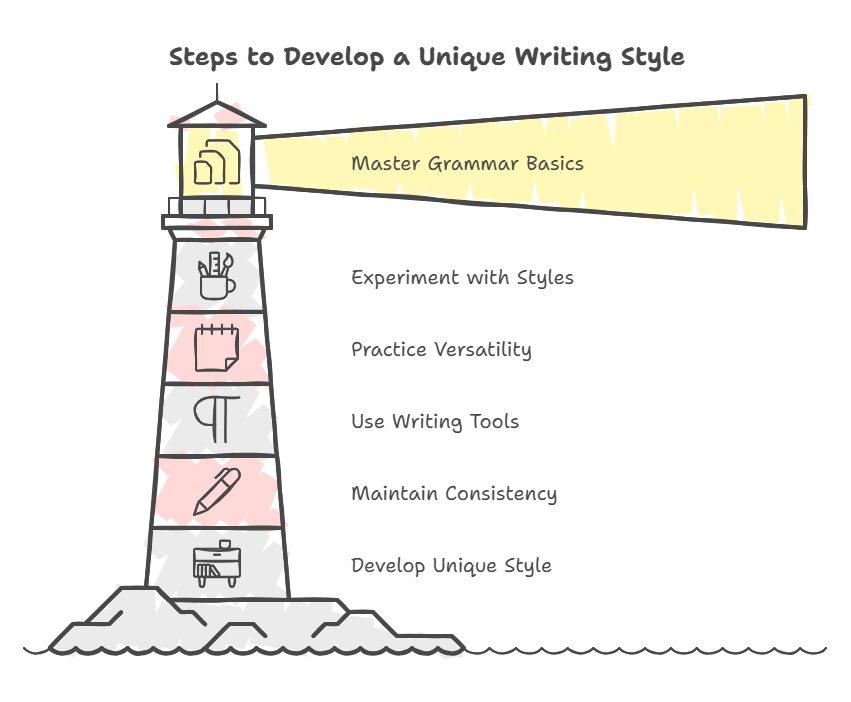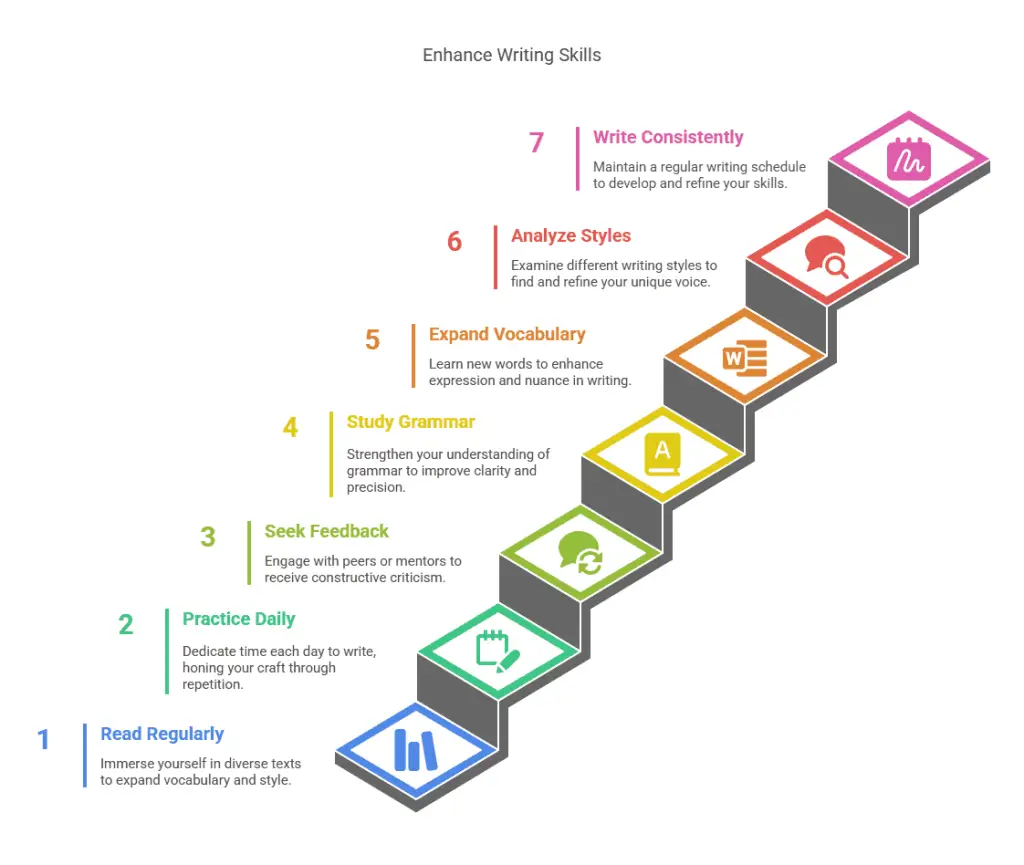Mastering writing skills is key for clear communication and career growth. This guide shares 7 Proven Strategies to Improve Your Writing Skills in 2025. You’ll learn how to understand your audience and find your unique voice. Each step helps you create sharper, more impactful content.
These strategies are for everyone, whether you’re a student, blogger, or business pro. They focus on structure, clarity, and consistency. You’ll learn to analyze what your readers need, develop a unique style, and organize your ideas well.
Key Takeaways
- Learn techniques to identify and meet audience expectations.
- Discover methods to refine your tone and maintain consistency.
- Use editing tools to enhance clarity and reduce errors.
- Organize content to maintain a clear flow and keep readers engaged.
- Overcome blocks with practical creativity exercises.
Use this guide to improve and enhance your writing. Each strategy is made to make your writing clearer and more effective.
Understanding Your Audience
Knowing your audience changes how you write. Making content fit their needs boosts engagement and clarity. These are key steps in writing improvement. Here’s how to start.
Identify Reader Preferences
Find out what they like by looking at:
- Survey results from direct reader feedback
- Social media interactions and comments
- Analytics on popular posts or articles
Research User Intent
User intent shows why readers engage. Use this table to match content:
| Intent Type | Example Query | Content Approach |
| Informational | “How to write a resume” | Step-by-step guides |
| Navigational | “Best grammar checker tool” | Tool comparisons |
| Transactional | “Buy grammar software” | Call-to-action focused |
Using these strategies sharpens your focus on what readers want. Adjusting your content based on preferences and intent builds trust. This makes writing improvement easier. Start small: check one article’s analytics today.
Developing Your Writing Style

Mastering grammar is key to a great writing style. Start by learning the basics of grammar tips. Clarity and confidence come when you know the rules well.
Try different things like changing sentence lengths or mixing formal and casual tones. This helps you find your unique voice.
Write the same passage in different ways every day. For example, take a simple paragraph and rewrite it for a formal report, a social media post, and a personal essay. This practice makes you more versatile and helps you remember grammar tips.
Tools like Grammarly or Hemingway Editor can also help. They show you where your writing might be unclear.
Being consistent in your voice is important. Look at how authors like Hemingway or Zadie Smith use grammar. Use their ideas but make them your own.
Let your own view shape your words, but don’t forget the basics. A good style is both creative and well-grounded in grammar.
Improve Your Writing Skills: Techniques for Success
Mastering effective writing is more than just practice. It requires using proven methods on purpose. Here are some actionable strategies to improve your writing:
Adopting a Unique Voice
Try writing the same scene in different styles to find what feels true to you. Writing daily about anything can also reveal your natural voice. Here are some creative writing tips:
- Read authors with styles you like to get inspiration
- Record your ideas to catch your natural way of speaking
- Make your drafts better by choosing unique words
Embracing Consistency in Tone
Keeping a consistent tone helps readers connect with you. First, decide on the main feeling of your message. Apply these writing techniques to maintain a consistent tone:
- Mark important phrases that show your tone in every version
- Use lists to make sure your words match your style
- Read your drafts out loud to catch any tone changes
Even small changes in voice and tone can make a big difference. These tips have helped me write more engaging content. They can do the same for you.
Improving Your Writing Clarity
Clear writing is key to effective communication. It helps readers quickly understand your message, whether it’s in a report, email, or social media post. By making complex ideas simple and improving sentence structure, you ensure your audience gets your point without confusion.
Concise phrasing often gets to the heart of what you want to say. This makes your writing more impactful.
- Trim jargon: Use simple language instead of technical terms unless your audience needs them.
- Use active voice: Sentences like “The team finalized the plan” are clearer than passive ones.
- Shorten long sentences: Break down dense paragraphs into easy-to-read chunks to keep focus.
- Seek feedback: Ask others to point out any confusing parts in your drafts to improve clarity.
Effective communication relies on how well your audience understands your message. Clarity makes complex ideas easy to act on. By focusing on simplicity and structure, your writing becomes powerful and relatable.
When ideas flow logically, readers remember them better. This ensures your work is both polished and easy to understand.
Organizing Your Writing for Impact
Effective organization turns scattered thoughts into compelling narratives. As a writer, I specialize in professional techniques that simplify complex concepts. A clear structure helps readers follow your message easily.
- Define a central theme before drafting
- Group related concepts into sections
- Use transitional phrases between paragraphs
Outlining is key to my process. Before writing, I make frameworks with:
- Broad topic headings
- Supporting evidence or examples
- Conclusion points for each section
Using professional writing strategies saves time. Outlines keep content focused and avoid unnecessary tangents. Tools like mind maps or digital note apps help see how ideas connect. Getting feedback from peers helps make the structure clear.
Organizing early helps avoid revisions that slow you down. This method works for blog posts or reports. It makes sure every part supports the main goal. Good structure is not just about order it’s essential for engaging readers.
Editing and Revising Your Work
Editing is where ideas shine. I start by stepping back from my draft to see it fresh. Even a 30-minute break helps me catch errors I’d miss.
- Read aloud to catch awkward phrasing.
- Use tools like Grammarly or Hemingway Editor to flag redundancies.
- Ask peers for feedback focused on clarity and flow.
Avoid these common pitfalls:
- Skipping grammar checks
- Ignoring tone consistency
- Rushing final reviews
| Before Editing | After Revising |
| “The story was good and I think it’s better now.” | “The narrative improved significantly through careful revision.” |
Using feedback boosts enhancing writing skills by showing blind spots. I track changes carefully, making sure each edit helps the reader. Mastering revision turns rough drafts into powerful work. Editing is key in the enhancing writing skills journey.
Overcoming Writer’s Block and Staying Inspired
Writer’s block doesn’t have to stop you. Even experienced writers sometimes struggle with creativity. This section will help you find ways to keep your writing proficiency strong.
Identifying the Root Causes
Figuring out why creativity stops is key. Common reasons include:
- Fear of producing imperfect work
- Unclear goals or overwhelming topics
- Physical or mental exhaustion
Practical Tips to Revitalize Creativity
Here are steps to get your creative juices flowing again:
- Take short breaks: Taking a 10–15 minute break can help you refocus.
- Freewrite without judgment: Write anything for 5 minutes to avoid self-criticism.
- Change your environment: A new place, like a park or café, can give you a fresh view.
- Break tasks into smaller steps: Tackling small goals can make things less overwhelming.
Using these tips regularly can help you overcome writer’s block. Small changes in your routine and mindset can turn blocked moments into chances for growth in writing proficiency.
Check out our job portal Write Remotely for the latest remote job listings and career resources.
Conclusion
Mastering writing means using the strategies we’ve discussed. Focus on what your audience needs, work on your writing style, and organize your thoughts well. This builds strong communication skills.
Editing and overcoming writer’s block are also important. My own experience showed that small changes, like outlining first, can make a big difference. This makes your writing clearer and more engaging.
Improving your language skills is more than just grammar. It’s about connecting with your readers. By using these strategies, you can turn simple ideas into powerful messages. Effective communication comes from practicing regularly, from editing your work to understanding what your audience wants.
Keep learning and growing as a writer. Ask yourself if your writing meets your audience’s needs and if it’s well-structured. Making small changes can make a big impact. Share your work, get feedback, and keep improving.
Writing is a journey, and it’s always evolving. Stay curious and keep refining your skills. The strategies we’ve discussed are tools to help you grow, one sentence at a time.
FAQ
What are some effective techniques to improve my writing skills?
Improving your writing skills involves a few key steps. First, find your unique voice and keep your tone consistent. It’s also important to be precise with grammar and clear in your sentences.
Reading and writing often, and asking for feedback, can also help a lot. These practices will make your writing better over time.
How can I develop my writing style?
Creating your own writing style takes practice and reflection. Begin by reading different styles and seeing what you like. Try out various techniques, like changing sentence lengths and adding dialogue.
Writing in a journal can also help you find your voice. This will lead to a writing style that’s truly yours.
What strategies can I use to improve writing clarity?
To make your writing clearer, simplify complex ideas and be brief. Use simple, direct language and avoid jargon. Organizing your thoughts and using outlines before you write also helps.
The main goal is to make sure your message is easy for others to understand.
How can I overcome writer’s block?
Breaking through writer’s block often means figuring out what’s causing it. It could be fear or too much pressure. Try taking breaks, doing creative exercises, or changing where you write.
Writing freely for a set time each day can also spark your creativity and get you going again.
What are some grammar tips for improving my writing?
To get better at grammar, use online tools like Grammarly or Hemingway for checking your work. Learn the basic grammar rules and practice them.
Reading your writing out loud can also help you spot mistakes and awkward phrases. This makes it easier to fix them.


 Owner of Write Remotely. Connecting businesses with talented writers and empowering remote work.
Owner of Write Remotely. Connecting businesses with talented writers and empowering remote work. 

